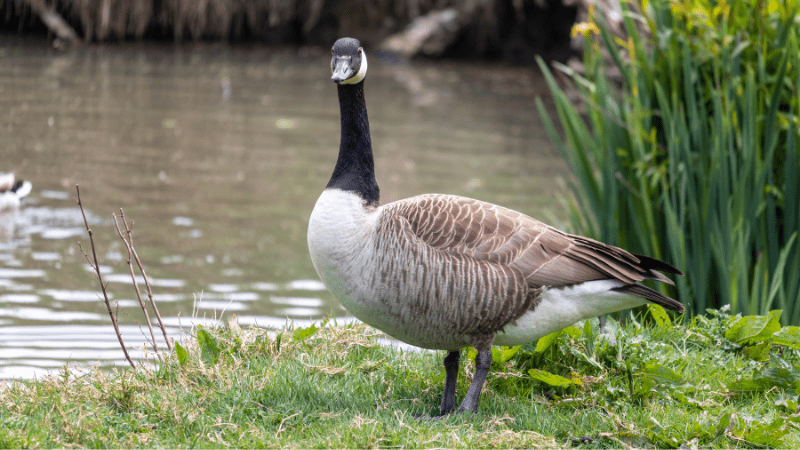How to Attract Geese to Your Pond (5 Simple Tips)
Having geese visit your pond can be a fun experience.
But, it also has its downsides.
If the benefits of having geese visit your pond outweigh the downsides, there are steps you can take to attract them and keep them coming back.
So, let's learn how to attract geese to your pond with five simple tips, how to keep them there, and whether or not geese are good for your pond.
How To Attract Geese To Your Pond

You can attract geese to your pond by providing a habitat that makes them feel safe and comfortable with plenty of food.
However, like ducks, geese can be hard to attract to your typical backyard pond. They require a very specific habitat that many backyards don't provide.
So, if geese frequent your area and you want to attract them to your pond, here are five simple ways to make your pond attract geese.
Food
Supplying ample amounts of food, one of their basic needs, is the first step in attracting geese.
But, what do geese eat in a pond?
Geese are mainly herbivores and prefer to eat grass, algae, and aquatic plants. However, some geese will also eat insects, making them omnivorous.
You can feed geese in a pond various foods, including corn, oats, grains, berries, certain bird feed, grass, etc. Just be sure to sprinkle them near the pond and not in it.
Keep in mind that they prefer feeding on pond plants. So, if you have any of these that you like and want to keep, then attracting geese to your pond might not be the best idea.
Hospitable Environment
Along with food and water, geese need a hospitable environment. The ideal environment will include:
- A large body of water (the larger, the better)
- Varying water depths (shallow shelves and deeper depths for diving)
- They prefer mowed grass around the pond
- Adding plants in and around the pond will effectively add another food source and help protect geese from predators and inclement weather.
- Providing nesting sites in shrubs and plants will help keep the geese and goslings around.
- You want your pond to be as far away as possible from any hunting ground, which could scare off the geese.
Eliminate Chemicals
Herbicides, pond algaecides, and insecticides, even those deemed safe for use in and around ponds, can kill food sources for the geese and potentially eliminate any viable shelter.
Also, keep in mind that waterfowl migrate around. Any chemicals they come into contact with in your pond could be carried over to another body of water, which could have detrimental effects.
So, choose natural removal methods for algae, weeds, and annoying insects.
Deter Predators
To make a pond more inviting, you'll want to deter any natural predators from the pond and the surrounding area.
Foxes, raccoons, coyotes, feral cats, etc., are all seen as predators and should be kept as far away from your land as possible. Even your pet dog or cat may appear like a predator, so it's good to keep them away from your pond as often as possible if you want to maximize the potential for geese to come.
Goose Decoys
Adding life-like goose decoys in and around the water is an effective way to attract geese to your pond that are passing by. And since geese feel safety in numbers, the more decoys you can add to the water (and around it), the better chance they will attract them.
Once you've piqued their interest with the decoys and have all of the above methods in place, plenty of food, a hospitable environment with shelter, and no predators around, they will be more likely to stick around.
Get Our Best Pond Tips Sent to Your Inbox for Free!
Join thousands of others and learn from our decades of pond building and maintenance experience! Your pond will thank you!
By subscribing you agree to receive emails from PondAcademy.com. We will always respect your privacy and you can unsubscribe at any time.
How to Keep Geese on Your Pond
Attracting geese to your pond or lake is one thing, but getting them to stay is another. After you've attracted the geese, it's important first to give them a reason to stay, and second, make sure they don't get scared off.
- Nesting Sites: Geese are more likely to stick around if there are suitable places to nest. Geese prefer to nest in elevated areas near the water with a good, expansive view around them.
- Keep Pets Away: House dogs and cats can be seen as a threat by geese, even if they are friendly. So, aim to keep your pets out of sight, or the geese probably won't stick around for long.
- Keep Water Accessible: You must keep a hospitable environment year-round for geese to stick around. That includes using a de-icer or heater in the colder months to ensure the water is accessible, refraining from covering the water with pond netting in fall, etc. Remember, geese can be selective about where they nest, so it's important to keep the area in and around the water as habitable as possible.
Are Geese Good For a Pond?
Aside from the visual appeal of having geese in a pond, they do provide some benefits, along with a few concerns, as well.
Geese love to eat! And as we mentioned above, they eat a lot of different types of food, including algae, aquatic weeds, and insects, none of which you want in your water.
However, geese are messy! In other words, they poop. A lot! I'm talking 1 to 2 pounds of excrement per day.
![]() Did you know...
Did you know...
Your average Canadian goose can poop up to 28 times per day!
This adds more waste to your water, contributing to sludge and providing nutrients for algae growth.
And since they travel from one body of water to another, there's the possibility that they will transfer parasites, bacteria, chemicals, etc., to your water. This could negatively affect your pond's ecosystem and any wildlife in it.
And let's not forget that geese can be very aggressive. They are large birds, and when they feel threatened, they will attack, potentially causing serious injury.
Whether you want to attract geese to your pond or not is up to you, just be aware of the pros and cons and have a maintenance plan in place if they decide to stick around for a while.
If your sole purpose is to create a spot for wild geese hunting or waterfowl hunting in general, this may not be a concern.




